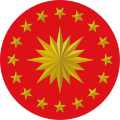Hulusi Akar | |
|---|---|
 Akar in 2019 | |
| Minister of National Defense | |
| In office 10 July 2018 –3 June 2023 | |
| President | Recep Tayyip Erdoğan |
| Preceded by | Nurettin Canikli |
| Succeeded by | Yaşar Güler |
| 29th Chief of the Turkish General Staff | |
| In office 18 August 2015 –10 July 2018 | |
| President | Recep Tayyip Erdoğan |
| Preceded by | Necdet Özel |
| Succeeded by | Yaşar Güler |
| Member of the Grand National Assembly | |
| Assumed office 2 June 2023 | |
| Constituency | Kayseri (2023) |
| Personal details | |
| Born | 12 March 1952[ citation needed ] |
| Party | Justice and Development Party |
| Spouse | Şule Akar |
| Children | 2 |
| Alma mater | Turkish Military Academy Queen's University Belfast United States Army Command and General Staff College Boğaziçi University |
| Awards | See below |
| Signature | |
| Nickname | Seri Paşa |
| Military service | |
| Allegiance | |
| Branch/service | |
| Years of service | 1973–2018 [1] |
| Rank | |
| Commands | Chief of the General Staff Commander of Land Forces Deputy Chief of the General Staff 3rd Land Forces Corps Land Forces Logistics Command Land Forces General Staff College Command Military Academy Command Chief of Plans and Policy Internal Security Brigade Command Chief of Public Information |
| Battles/wars | Bosnian War ISAF Coalition Kosovo War Turkey-PKK conflict Turkey-ISIL conflict Operation Shah Euphrates Operation Euphrates Shield Operation Olive Branch Operation Peace Spring |
Hulusi Akar (born 12 March[ citation needed ] 1952) is a retired four-star Turkish Armed Forces general who served as the Minister of National Defense from 2018 to 2023. He previously served as the 29th chief of the Turkish General Staff. [2] Akar also served as a brigade commander in various NATO engagements including the International Security Assistance Force against the Taliban insurgency,Operation Deliberate Force during the Bosnian War,the Kosovo Force during the Kosovo War,as well as overseeing much of the Turkish involvement in the Syrian Civil War. [3] [4] [5]
Contents
- Early life and education
- Military career
- Chief of General Staff
- Defense minister
- Awards and decorations
- Personal life
- See also
- References
In the 2023 Turkish parliamentary election he was elected to the Grand National Assembly of Turkey from Kayseri representing the Justice and Development Party.





